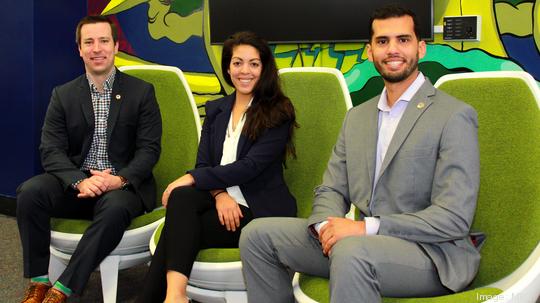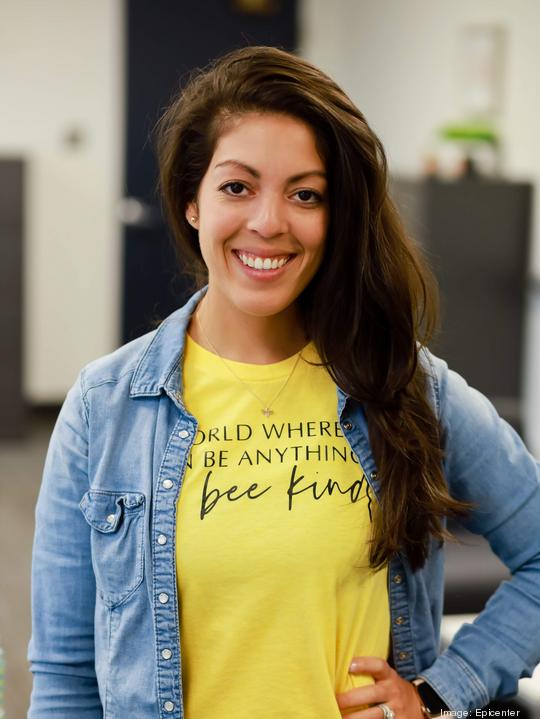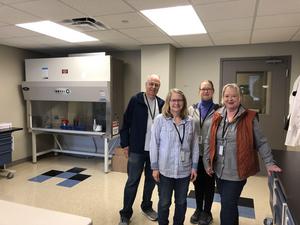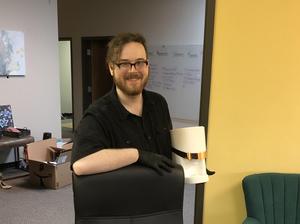
Kayla Rodriguez Graff’s favorite stories are the ones about patients.
She’s the co-founder and CEO of the local startup SweetBio, which has created a bioengineered wound care product, Apis, that’s derived from collagen and Manuka honey. And often, she and her team hear stories about how it’s helped wounds close and stopped amputations. They’ll receive photos of patients who, previously debilitated by pain, are standing on their own two feet.
“We’re just elated when we can hear patient stories,” Rodriguez Graff said. “There’s really no words that can explain what an honor it is to be able to do what we do.”
Rodriguez Graff hopes the number of these stories can increase, as SweetBio gears up for a commercial launch and looks to widen its impact. Already, Apis has been used by several hundred patients across the country, and the company expects to officially launch it early in the fourth quarter. The plans for that launch, however, have changed over time.
Adapting amid the pandemic
SweetBio received FDA clearance in May 2019, and it spent the rest of the year collecting clinical data. The launch was expected to come soon after this. But in early 2020, COVID-19 spread rampantly across the globe, drastically impacting the health care sector.
So, Rodriguez Graff and co. decided to hold off on the launch, and assess the situation. The pandemic, they realized, wasn’t going to fade quickly.
“The best thing a small company can do, when you’ve got such massive macroeconomic changes happening, is just take a step back and listen, try to read the tea leaves, try to get as smart as you can, and skate to where the puck is going to be,” Rodriguez Graff said. “That’s where our focus has been during this time.”

For the types of patients who use Apis — often with diabetic ulcers, venous ulcers, bed sores, and lesions at surgical sites — the pandemic brought a catch-22. Because many of them had chronic conditions, they were more susceptible to severe cases of illness; and they were hesitant to go to hospitals and physicians’ offices for treatment, due to the risk of catching COVID-19. Yet at the same time, staying home and forgoing treatment meant risking infection — and amputation.
The pandemic, however, also brought an increased emphasis on telemedicine and home health, and this is something SweetBio hopes to capitalize on as it looks to increase the accessibility of its products.
Into homes
A traditional commercial launch would see its offerings sent to hospitals and doctors' offices, where the treatment would be administered by clinicians. And the SweetBio team still wants physicians to assess wounds, write the prescription, and handle follow-up appointments. But they’re determined to get their products into homes, where they would be administered by either the patient or their loved ones, rather than clinicians.
“The home has become the most convenient and practical place of care so, 'How do we fit in this space, and where is it that we can innovate to help improve care in this space?'” Rodriguez Graff said. “'How do we get more advanced technologies in the home?'
"They have to be easy to use, and they have to be in a price point that makes sense," she continued. "That has been our mission: 'How do we bring our technology, in an easy-to-use, affordable way, that removes many barriers from people receiving treatment?'”
The product used in the home might not be Apis, either. It could be SweetBio's second product, which is set to be made from the same core of collagen and Manuka honey, but have a new variation and new name, which hasn't been disclosed.
Still, while the company is intent on getting its products into homes, they'll continue to be used in hospitals and physician's offices, too. As Rodriguez Graff noted, wound care is complex, and different wounds require different levels of treatment.
The goal is to ensure they can “cover all the sites of care, where people need treatment." And it’s likely the launch could see the products sent to hospitals and doctors' offices first, as SweetBio navigates through the regulations that could allow Apis to be sent into homes.
SweetBio's increased flexibility stems, in part, from gaining Medicare reimbursement. Medicare now pays for the majority of the cost of its products, for those covered by it.
"The wounds we’re talking about, disproportionately affect those 65 and older," Rodriguez Graff said. "To be in the Medicare space, and have that Medicare reimbursement is massive. ... [It] allows us to be across multiple places of care, including the home, the [doctor's] office, and hospitals."
More funding
As SweetBio prepares to launch its product, it’s also looking to secure more funds. It’s raised just over $5.5 million, and is currently in a $500,000 seed round, which helps prepare it for a larger, Series A funding round in the fall to accelerate commercialization.
The company hasn’t decided how large that round will be. But Rodriguez Graff estimates it should be between $5 million and $10 million.
“We have cleared all of the hurdles from the FDA, patenting, and Medicare; we have clinical publications that are peer reviewed,” she said. “Now we are ready to scale, and use a larger round to be able to fuel that growth."









